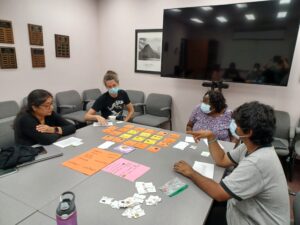The class was an innovative interdisciplinary course that used gamification, role plays, and other active learning techniques to help prepare UMBC students to effectively work with immigrant students and parents in Kindergarten-College. We aimed to prepare UMBC students with advocacy skills so that they are more prepared to advocate for, and alongside, immigrants in our communities. The assignments were all applied in nature. They were designed to assess learning through the use of assignments that will be relevant to their careers such as writing grant applications, giving presentations, writing an op-ed or a standard operating procedure. In line with adult learning principles, we aimed to provide students with agency in deciding what to do for their final projects. Lastly, the class aimed to provide an interdisciplinary learning setting so students across majors can learn from one another and practice working in interdisciplinary teams. The goal is to revamp the course to be run as an Honors Course here at UMBC in the future.
Students said the following:
- “I feel much more respected with the way the class is set up and the different techniques we have been using in comparison to the typical lecture-based classes with little to no discussion.”
- “The process of using different pedagogies is what worked for me. My attention remained engaged throughout the classes because the teaching style changed, keeping my mind stimulated.”
- “One of the ways that I think worked best for me is the game play. It gave us the ability to apply not only the knowledge that we have gained from our social work classes but also knowledge and skills gained from everyday life. We were not just listening to what is being said as we would in lecture, but rather applying.”
- “The simulation activity was very powerful. With the journey activity, we were able to imagine ourselves in the shoes of the person and feel those emotions in real time.”
- “I have been able to build my knowledge and take notes during the mini-lectures, then immediately apply those principles during discussion.”
- “Listening to [Guest Speakers] who have actively experienced the topics being discussed provide a level of intimacy that cannot be taught through a textbook”
- “The [iterative] role play activity was very interesting and engaging. It was interesting to see the progression of the conversations as more details were added into the storyline. Role plays aren’t always my favorite because I am not super outgoing, but in our class setting I feel more comfortable doing activities like that.”
- “By preparing a presentation instead of just an essay, I learned more on how to talk about education. The process of making the presentation helped me to think critically about my findings, as I had to summarize them fluently.”
